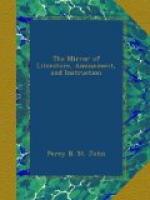* * * * *
MR. ALLAN CUNNINGHAM
Needs no testimony either to his intellectual accomplishments or his moral worth; nor, thanks to his own virtuous diligence, does he need any patronage. He has been fortunate enough to secure a respectable establishment in the studio of a great artist, who is not less good than great, and would thus be sufficiently in the eye of the world, even were his literary talents less industriously exercised than they have hitherto been. His recent Lives of the British Painters and Sculptors form one of the most agreeable books in the language; and it will always remain one of the most remarkable and delightful facts in the history of letters, that such a work—one conveying so much valuable knowledge in a style so unaffectedly attractive—so imbued throughout, not only with lively sensibility, amiable feelings, honesty and candour, but mature and liberal taste, was produced by a man who, some twenty years before, earned his daily bread as a common stone-mason in the wilds of Nithsdale. Examples like these will plead the cause of struggling genius, wherever it may be found, more powerfully than all the arguments in the world.—Ibid.
* * * * *
DUELLING
Is the only crime into which an upright man, wanting in moral firmness, can be impelled by the law of honour. Surely there could be no difficulty in putting an end to this absurd and abominable practice by wholesome laws. Appoint six months’ imprisonment for the offence of sending a challenge, or of accepting it; two years if the parties meet; and if one falls, transport the other for life. Appoint the same punishment in all cases for the seconds; and from the day in which such a law should be enacted, not a pair of duelling pistols would ever again be manufactured in this country, even for the Dublin market.—Ibid.
* * * * *
CARDINAL MAZARIN.
The pecuniary wealth, the valuables and pictures of Mazarin, were immense. He was fond of hoarding,—a passion that seized him when he first found himself banished and destitute. His love of pictures was as strong as his love of power—stronger, since it survived. A fatal malady had seized on the cardinal, whilst engaged in the conferences of the treaty, and worn by mental fatigue. He brought it home with him to the Louvre. He consulted Guenaud, the great physician, who told him that he had two months to live. Some days after receiving this dread mandate, Brienne perceived the cardinal in night-cap and dressing gown tottering along his gallery, pointing to his pictures, and exclaiming, “Must I quit all these?” He saw Brienne, and seized him: “Look,” exclaimed he, “look at that Correggio! this Venus of Titian!




